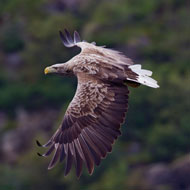
RSPB believes first-time parents may have two chicks
A white-tailed eagle chick has hatched in Orkney for the first time in over 140 years, RSPB Scotland has revealed.
One chick has been spotted but staff believe there may be two, judging by the behaviour of the parents.
White-tailed eagles, or sea eagles, reappeared in Orkney five years ago, after being wiped out in the UK in the early 20th century. A number of reintroduction programmes, beginning in the 70s, brought the species back to Scotland.
A pair has been sighted in Hoy every year since 2013 but nesting attempts were unsuccessful in 2015 and 2016.
Lee Shields, RSPB Scotland’s warden for Hoy, said: “It’s fantastic that the eggs laid in spring have hatched, the first successful breeding season here since the 19th century. This breeding attempt is still at the early stages, with young often in the nest for up to 14 weeks. Everybody was so excited when the first pair arrived and we’ve been keeping our fingers crossed for this ever since.
“We were hugely disappointed when a previous pair abandoned the territory last year, so to have at least one chick now is even more special.
“Even though they hadn’t nested here since 1873, white-tailed eagles have long been associated with Orkney’s natural and cultural heritage. Our RSPB Scotland reserve in Hoy is already home to hen harriers, great skuas, red-throated divers and more, so to see the eagles return backs up just how special this environment is.
“Now we’re just hoping that the chicks do well as it’s always uncertain with first-time parents.”



 The Veterinary Medicines Directorate (VMD) is inviting applications from veterinary students to attend a one-week extramural studies (EMS) placement in July 2026.
The Veterinary Medicines Directorate (VMD) is inviting applications from veterinary students to attend a one-week extramural studies (EMS) placement in July 2026.